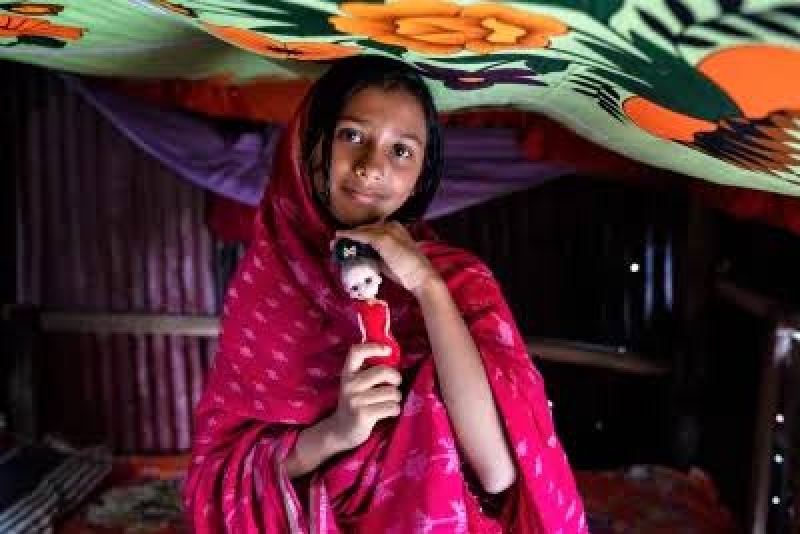- Dhaka’s air recorded ‘unhealthy’ Monday morning |
- CA Urges IFAD to Launch Social Business Fund for Agri Youth |
- OIC Condoles the Passing of Members of the Amiri Diwan |
- Bangladesh’s stock market tumbles at week’s start |
- Police disperse teachers' rally in front of National Press Club |
Bangladesh intensifies fight to end child marriage

With child marriage still affecting one in every two girls in Bangladesh (51%), the government is stepping up efforts to reverse this trend.
At the current slow pace of a 2% annual decline, it would take two centuries to end the practice.
Determined to accelerate progress, the government of Bangladesh has convened a high-level Inter-Ministerial Dialogue to define a unified roadmap for ending child marriage once and for all.
The dialogue, led by the Ministry of Women and Children Affairs (MOWCA), the Department of Women Affairs (DWA), and supported by the United Nations Population Fund (UNFPA), brought together Secretaries and senior officials from the Ministries of Education, Law and Justice, Information and Broadcasting, as well as the Local Government Division and the Cabinet Division, to translate data and commitments into concrete action.
“The acceleration we seek will only be achieved when these actions are taken in tandem, creating a web of protection so strong that no girl can fall through,” said Catherine Breen Kamkong, UNFPA Representative in Bangladesh.
“A girl kept in school is still at risk if she lacks legal protection, comprehensive life skills, and opportunities. A strong law is meaningless if enforcement fails. This is why today’s meeting represents a true whole-of-government response in action.”
The ministries agreed on a set of evidence-based, time-bound actions that together aim to create an environment where every girl can grow up free from coercion and with full control over her future.
The Ministry of Law and Justice was called to digitise the marriage registration system to prevent falsification of age and reforming the Child Marriage Restraint Act to close legal loopholes.
The Ministry of Education will aim at reinforcing school retention mechanisms and strengthening provision of comprehensive life skills education, including health and wellbeing, making schools safer for girls and recognising education as “the most effective vaccine against child marriage.”
The Ministry of Health and Family Welfare was invited to integrate a comprehensive and rights-based adolescent sexual and reproductive health package into the national Universal Health Coverage framework to reduce high adolescent pregnancy rates, as well as introduce a dedicated service package for married adolescent girls and first-time young parents.
The Local Government Division was invited to empower local government actors through performance-based funding and stronger accountability, while strictly enforcing universal birth and marriage registration for reliable age verification to effectively prevent child marriage at the grassroots level.
The Cabinet Division will explore ways to establish the prevention of child marriage as a core national and district-level priority by embedding it into national development plans, mandating the District Commissioners to create and and be accountable for fully costed action plans, and promoting inter-district collaboration on best practices.
The Ministries of Social Welfare and Information will tackle economic drivers and harmful gender norms, using both social protection schemes and large-scale norm change interventions to shift attitudes at the community level.
“While Bangladesh has made commendable progress for women and girls, child marriage remains a major challenge. It snatches away a girl's childhood, cuts short her education, and creates severe health risks, all of which hinder our national development,” said Mamtaz Ahmed, Senior Secretary of the Ministry of Women and Children Affairs.
“The government of Bangladesh is resolute in its commitment to ending this practice through multifaceted, coordinated action," he said.
The meeting concluded with an agreement to present the consolidated action points at the upcoming National Child Marriage Prevention Committee meeting for further endorsement and action.
MoWCA and UNFPA will be tracking implementation progress and providing technical assistance to ministries and local governments.
Earlier in the day, participants toured the “Shombhabonar Frame (Framing Possibilities)” photo exhibition, which vividly portrayed the lives and dreams of adolescent girls across Bangladesh.
The exhibition, featuring images and stories of resilience and hope, grounded the policy dialogue in real human experiences, underscoring the urgency of protecting girls from early marriage and promoting their education, health, and empowerment, reports UNB.
The event closed on a message of collective determination.
“We have the evidence. We have a plan. And now, we have the collective will to act,” concluded Ms. Breen Kamkong. “Together, we can build a Bangladesh where every girl’s childhood is protected, her choices respected, and her potential fully realised.”

